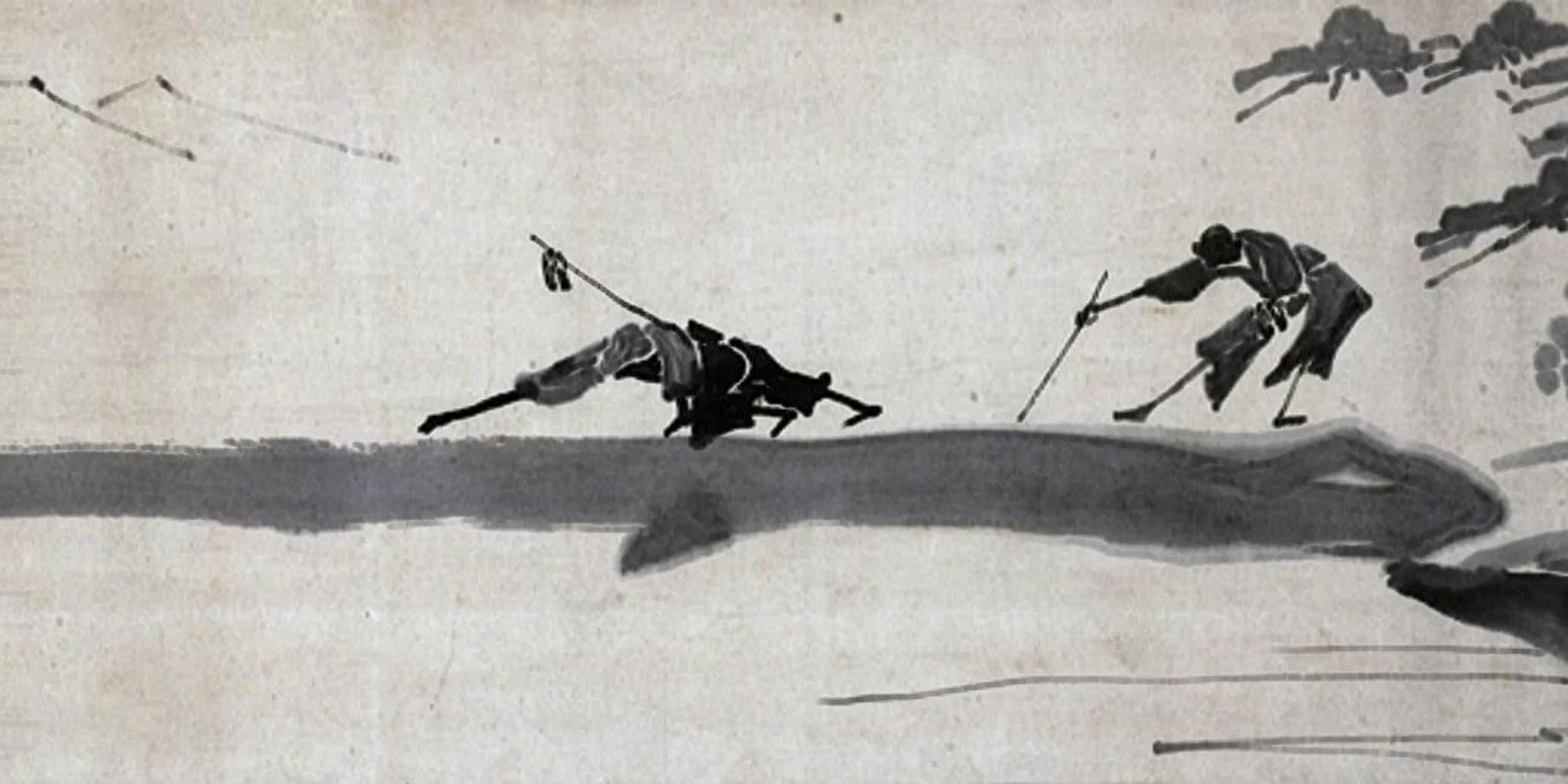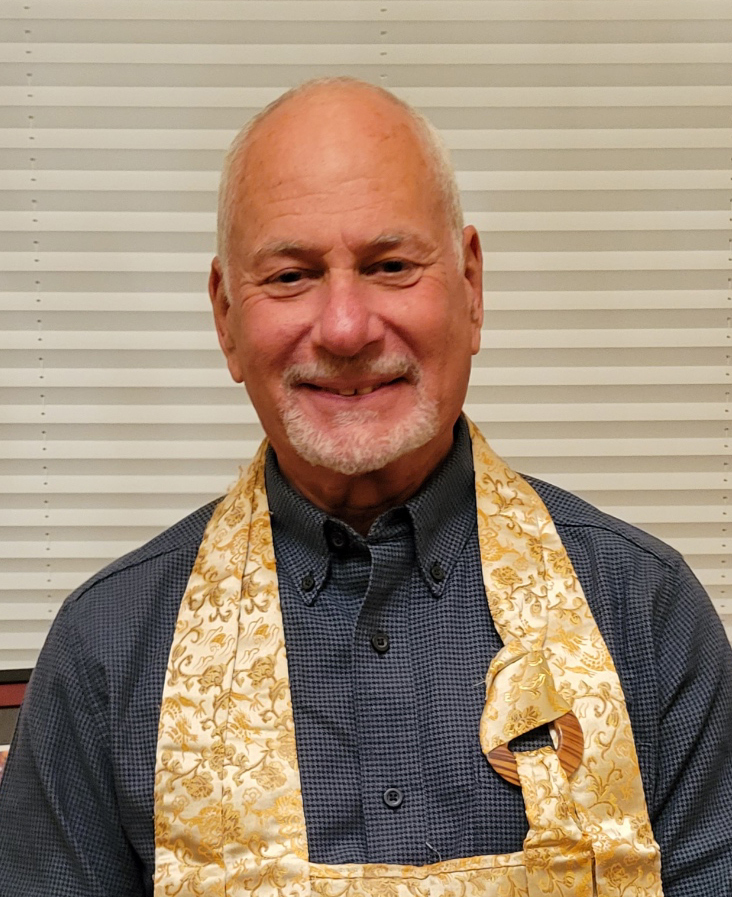
Blind Men Crossing a Rope Bridge, Hakuin Zenji
A course for Dharma Successors, Dharma Holders, and Senior Students
Course Dates:
Second and Fourth Saturdays beginning June 2022. June 11; July 9, 23; Aug. 13, 27; September 10; Oct. 22; Nov. 26; Dec. 10.
Daily Times (Eastern Time):
9:00 am to 11:00 am
Cost:
This course is FREE! Because this course includes advanced koan practice on the Harada-Yasutani Boddhisatva Precept koans, we are only allowing participants to register who are in The Zen Garland Order Teachers’ Circle or are senior students advanced in koan study recommended by their TZGO teachers. Please do not take this course unless you can commit to attending the classes, to reflecting profoundly, and to reading the assignments. There will be no recordings.
Donations accepted.
Donation form (please add a note mentioning this course)
Course Format:
Synchronous Online Course (Zoom discussions)
“Koan practice is first and foremost religious practice undertaken primarily…[for] the traditional Buddhist goals of awakened wisdom and selfless compassion.” Victor Sogen Hori, Zen Sand, p.6.
In the multiverse of awakened reality, each and everything influences and is influenced by every other and all, manifests as a system and as no-thing-at all. In the shifting dimensions of this reality where nothing is independent and indeterminacy reigns, what can we know, what can guide us, what matters? If we are not any more independent than anything else, where does responsibility and accountability reside?
The Harada-Yasutani koan system, which serves as the core of our training curriculum, teaches the Zen Bodhisattva Precept Koans last as the most profound, demanding, and essential Zen study possible. Our ethics should integrate all aspects of our lives, guide our moment-to-moment choices, and set our longer-term directions. When we treat ethics as a koan, the whole universe becomes ethical interdependence, ethical interaction, and ethical co-creation.
- We will trace the historical shift in ethical framework that took place in the Mahayana revolution in India and the transformation that continued in China. We will trace the influence of the Avatamsaka Sutra and the Huayen school on the Chinese apocryphal Brahmajala Sutra, Brahma Net Sutra, which gave rise to the Bodhisattva Precepts and took its name and spirit from Huayen metaphor of Indra’s Net!
- We will touch on Heidegger’s lament in his works on metaphysics that a new and different Western logic was needed to match the inter-creative world of his vision; and we will test how Nargarjuna’s Four-Fold Logic (four propositions, one hundred negations) provides the necessary system to match that task.
- To help ground us on our journey we will take a stroll with Dogen Zenji and his favorite disciple, Ejo and join them in a discussion of Nansen killing the cat and Hyakujo exorcising a fox spirit.
- The Zen tradition teaches the Bodhisattvas Precepts, and we teach The Zen Garland Order Vows, as contextual and situational, a matter for anattara-samyak-sambodhi, the multiple perspectives of full enlightenment. To deepen this we will examine Dogen Zenji’s “Kyojukaimon,” Instructions on Transmitting the Bodhisattva Precepts with Harada Roshi and Yasutani Roshi’s commentary on the Kyojukaimon and Precept Koans on it.
- We will also look at The Zen Garland Order vows and Zen Ethics from Western perspectives of both intellectual and moral virtue ethics, deontology, and consequentialism.
- According to Daniel Kahneman in his masterwork, Thinking Fast and Slow, most of our actions, choices, and decisions are made in “fast thinking,” and are somewhat automatic and unconscious. Fast thinking is tainted by inherent and learned, conscious and unconscious biases, including taking our sensory experience as replicative of an absolute reality. How do we train ourselves to carry our ethics into the spontaneous improvisation of immanence, the rush of momentary existence? I will offer Zen Developmental Somatic Ethics tempered by deconstructive study of bias as one set of practices to address this.
- Finally, we will discuss each Zen Garland Order Vow as a separate practice, and collectively as interactive, inter-dependent systems.
The Zen Garland Vows
I vow to take refuge in the Buddha,
I vow to take refuge in The Dharma,
I vow to take refuge in the Sangha.
I vow:
To realize and release what is unwholesome,
To realize and cultivate what is wholesome,
To purify my way of being.
This is the teaching of all Buddhas.
I vow to embrace each moment with Not-Knowing, the Practice of Presence and Service as a way of being.
I vow devotion to Zazen, and to manifesting a field of benefaction.
I vow to transform ignorance, anger, greed, and suffering into wisdom and compassionate action.
I vow to speak from the heart, to listen wholeheartedly, and to seek the wisdom of council.
I vow to cultivate respect and dignity in all relationships.
I vow to use discernment from a perspective of unity and to nurture a culture of cooperation.
I vow to seek what is needed responsibly, to share generously, to work well with what I have, and to take only what is given freely.
I vow to promote solidarity and a just economic order.
I vow to care for the sacred elements – earth, water, air and fire, and to help heal all forms of matter and energy that co-create our precious earth and universe.
I make these vows in oneness with the Zen Garland Community and cultivate its practices for the welfare of all creation.

Roshi Paul Genki Kahn
One of the living Zen masters of our time, Roshi Genki augments traditional Zen practices with modern psychology, philosophy, science, and socially engaged service to marginalized and disadvantaged communities. He has developed a thorough and profound holistic approach to Zen practice that offers personal and inter-relational development for skillful living in the world with love, service and joy.
Interested in other Zen Garland Order courses, workshops, and retreats?
We have in-person (when appropriate), online, and on-demand offerings for sangha members and others.